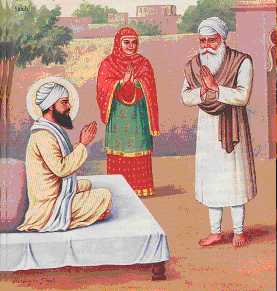Posted by
Jugraj Singh Randhawa
 In the home of Khalsa I marry and by following in the steps of Bibi Amro Ji I become a proper daughter-in-law.
In the home of Khalsa I marry and by following in the steps of Bibi Amro Ji I become a proper daughter-in-law.
In this day and age it is easy to become a wife but nearly impossible to become a true daughter-in-law. That is why it is very important for us to look at the life of Bibi Ji and understand why this is so. Bibi Amro Ji was willing to learn and use her understanding to create her own identity and fulfil her destiny.
Bibi Amro Ji’s willingness to learn made her life extraordinary for that time period because she had an academic education. Bibi Ji was educated not only in the household ways but she was also educated in reading and writing Gurmukhi. Traditionally the women of that time only received a domestic education because it seemed useless to receive an academic one. But Bibi Ji received both and she used her knowledge to learn Gurbani by heart while taking care of doing all the household work at same time. In this way, when Bibi Ji got married, she was able to sing Gurbani as she worked. One day while she was working in the kitchen her husband’s uncle, Guru Amar Das Ji, who lived next door heard her and got inspired. Guru Amar Das Ji immediately came over and requested Bibi Ji’s mother-in-law to ask Bibi Ji to sing Gurbani again and tell him all about it. Bibi Ji did just that and Guru Amar Das Ji was deeply touched and went to serve Bibi Ji’s father, Guru Angad Dev Ji. Guru Amar Das Ji later would become the third Guru of the Sikhs, all because the Guru touched his heart through Bibi Ji.
Bibi Ji inspired Guru Amar Das Ji, so why today we are so unwilling to learn Gurmukhi and inspire our families on the path of Sikhi. An all around education today would mean learning from our mothers the best way to run a household, not just getting an academic education. Only when we are capable of running our homes and nurturing our families, can we fulfil our destinies. Let’s all be like Bibi Amro Ji and learn everything we can be a source of inspiration.
When we inspire others and uplift them we also get the chance to create our own identity. Bibi Amro Ji inspired Guru Amar Das Ji and in turn she was able to teach Sikhi freely. It was almost unheard of in those times for women to teach, but Guru Amar Das Ji put her in charge of one of the twenty-two teaching districts (manji.) In fact, you can credit Bibi Ji for many of the things that Guru Amar Das Ji did for the equality of women. She was his inspiration and he wanted more women to have the same chance she did so they could inspire more Sikhs. So through her ability to inspire she made just as big, if not bigger an impact on Sikhi then she did with her teaching after she received that responsibility from the Guru. This story serves as a reminder to all of us as Sikh women that if we can be good daughters-in-law then we can accomplish more then we could with only a professional career. Bibi Amro Ji is a prime example that, as a woman, you can be a householder and also accomplish your dreams.
Bibi Ji has to be the first women in Sikh history that held a job outside of her home successfully. Bibi Ji had the responsibility of collecting dasvandh and of making decisions for the welfare of people that lived in the area of which she was in charge. That included the village Basarke, where she lived with her family. Bibi Ji was so good at her job that she is credited, along with other Sikh teachers, for making Amritsar what it is today. There also has been a beautiful sarovar (sacred pool of water) created in her memory, so she will never be forgotten.
So how did she mange all this in a time period where women barely left their homes and lived subjugated lives? She managed it with the support of her family, her in-laws. She didn’t try to do everything on her own. She included her family in her decisions. She respected them and asked permission from her in-laws before proceeding. She gave her in-laws love and respect, and in return they accommodated her so she could do her job.
That is exactly where we go wrong today. We don’t work inclusively with our in-laws. We are so busy trying to create our own separate identity that we forget that without the help of our in-laws it is doubly hard work. Double work in the sense, that we now have to work in the real world and also try to run our own homes. If we lived all together peacefully like Bibi Amro Ji, we would have an extended family to help us out at home. We have lost that positive way of working together as family and sangat and forgotten that through teamwork with our loved ones, we can accomplish anything.
That’s what being a daughter-in-law is all about, it’s about moving forward with your family. It is pointless to be at the top if you are there all by yourself. Today we think it is hard to live in extended families because we don’t get as much privacy as we like. But what we forget is that if we live in harmony with our family and look out for each other, we can accomplish much more than we could ever do alone. Yes, sometimes in an extended family we go through hard times full of emotions and miscommunication, but let us never give up without even trying. It is my humble request to every women marrying into an extended family to think as Bibi Amro Ji did and not go in with resentment, negative thoughts or vibes. Following in the steps of Bibi Ji we can accomplish more then we can ever imagine.
Share This Post
This entry was posted on October 4, 2009 at 12:14 pm, and is filed under
voices
. Follow any responses to this post through
RSS. You can
leave a response, or trackback from your own site.



Post a Comment